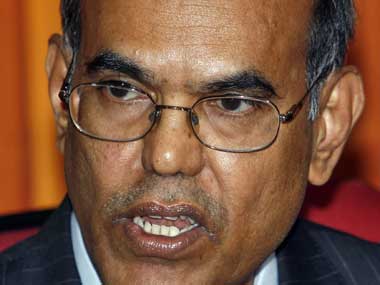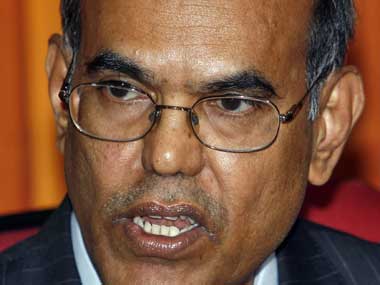Reserve Bank Governor Duvvuri Subbarao has almost thrown up his hands in despair. A day before the third quarter monetary policy review was due to be unveiled, the governor has effectively said that he can’t do much about inflation when the government is ruining the fiscal situation by overspending.
In a pre-policy analysis of the economic situation , Subbarao has indicated that falling inflation may be short-term in nature, and hence the window of opportunity to lower rates and ease the tight money policy is very narrow.
This means, the market should not get its hopes up too much on big and continuing rate cuts.
The RBI said: **"**While in the short run, moderating inflation will provide some space for monetary policy to address growth concerns, in the absence of structural measures to address supply bottlenecks, this will be, at best, a temporary respite. In addition, the expansionary fiscal stance has emerged as an upside risk to inflation."
[caption id=“attachment_191376” align=“alignleft” width=“380” caption=“RBI Governor D Subbarao. Reuters”]
 [/caption]
[/caption]
Subbarao is clear who’s to blame for all this: the government. “Upside risks to inflation persist from insufficient supply responses, exchange rate pass-through, suppressed inflation and an expansionary fiscal stance.” Each of these problems can only be addressed by the government. The RBI can do little.
This is as plain a language as any governor can use to tell the government that it has to get its budget act together by cutting subsidies. It must also start taking long-term measures to improve supplies in the items that actually impact inflation: food inflation, led by unmoderated increases in pulses, fruits and vegetables, milk and eggs and meat products ( Read Firstpost story here ).
The RBI recognises that inflation has only been “suppressed” by the government’s failure to pass on oil price increases. The minute monetary policy eases up, inflation could well spring back like a Jack-in-the-Box. This is why the RBI may not commit to reducing rate steadily from now on.
This does not mean Subbarao will not send some signal on monetary easing on Tuesday, but he seems unsure he can do too much. In the pre-policy review, the Reserve Bank notes that “growth has weakened as a result of adverse global and domestic factors. However, inflation and expectations of inflation remain high and upside risks emanate from exchange rate pass-through, revisions in administered prices and higher-than-expected government revenue spending. Consequently, monetary actions will need to strike a balance between risks to growth and inflation”.
“Striking a balance” means the RBI is indeed worried about a drastic growth slowdown, but it also wants to note that inflation is far from licked. So, if the government won’t curb its own bloated expenditures, one can’t expect too much leeway from the central bank.
As far as predictions go, the central bank said: “Growth in 2011-12 is moderating more than was expected earlier. The business climate has weakened. The slack in investment and net external demand may keep the pace of recovery slow in 2012-13.”
The RBI blames the government for poor budgetary control, as it has been unable to rein in subsidies or push reforms through. It observes: “The central government’s deficit indicators are under duress due to higher subsidies and lower tax collections. Fiscal slippages during 2011-12 may complicate the task of aggregate demand management. Fiscal reforms, including the Direct Tax Code and the Goods and Services Tax are, therefore, needed to contain deficits in 2012-13.”
Subbarao’s advice is the same as any sensible economist would be making in a year when not one of the government’s forecasts-on growth, inflation, deficits, disinvestment and revenue-has come true: spend less on consumption, more on investment. “There is need for budgetary solutions to growing subsidy commitments and to rebalance public spending from consumption to investment in order to enhance the potential growth rate of the economy.”
The key takeout from the pre-policy analysis is this: Subbarao is no longer sure that the monetary cycle has definitely turned downwards. In October, he talked about not raising rates in December. Now, he says nothing can be guaranteed: “Factoring in increased downside risks to growth and the expected moderation in inflation, the policy rate was kept on hold in December 2011. The trajectory of the monetary cycle ahead will be shaped by the evolving growth-inflation dynamics.”
Firstpost has written that the recent fall in inflation may be temporary since protein-based inflation in food and suppressed energy prices are waiting to recoil on the economy.
Our best guess is that in Tuesday’s monetary policy review the governor will ease the cash reserve ratio (CRR) as liquidity in the money market is tight, but may not offer any significant rate cuts. He may announce a small rate cut of 25 basis points but warn that it may not continue indefinitely.
)